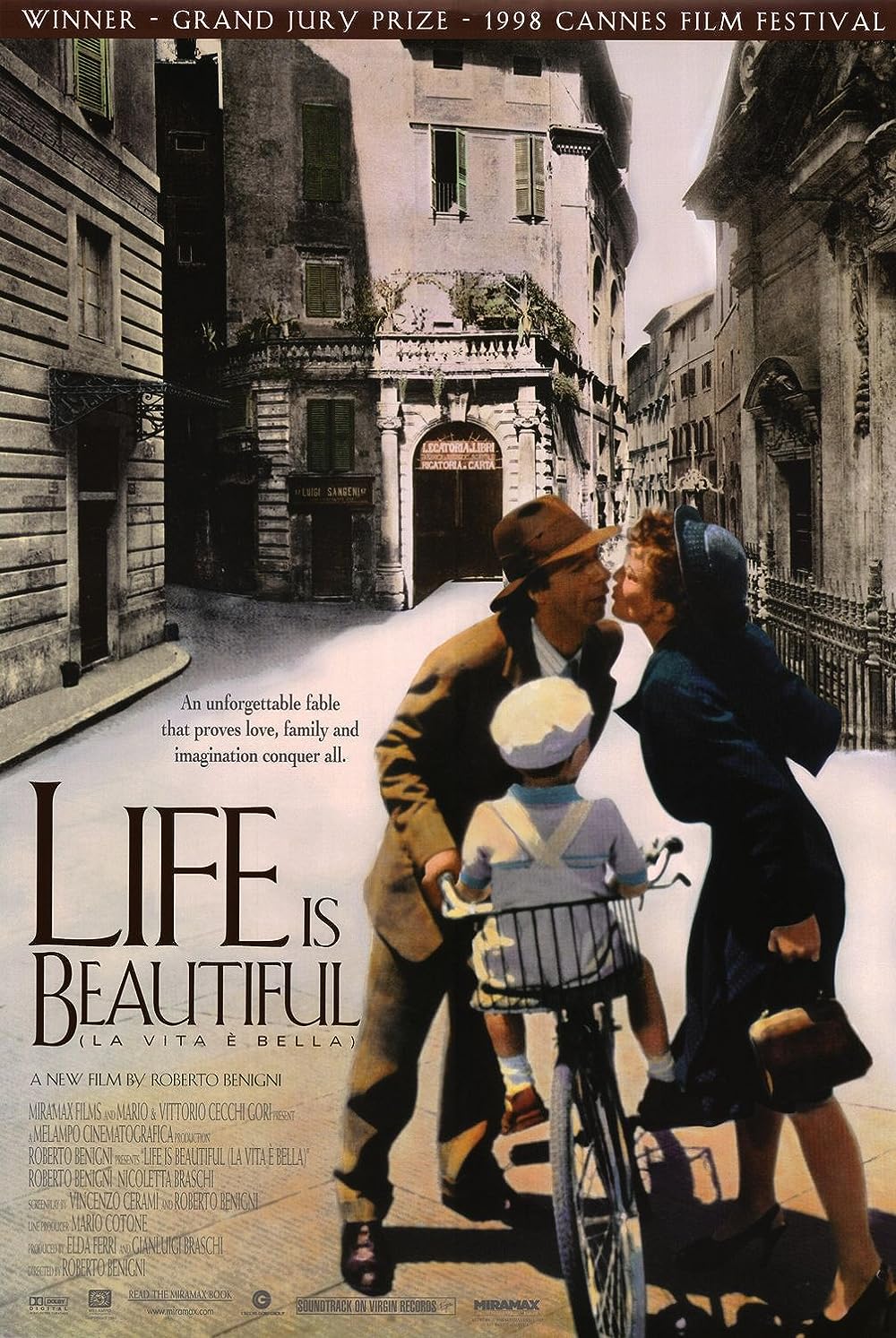Introduction:
Released in 1997, “Life Is Beautiful” (Italian title: “La vita è bella”), directed and starring Roberto Benigni, is a groundbreaking film that seamlessly weaves comedy and war into a heartwarming narrative. Set against the backdrop of World War II, the film unfolds as a unique exploration of the human spirit’s resilience in the face of unimaginable challenges. This comprehensive review aims to dissect the various layers of “Life Is Beautiful,” delving into its narrative brilliance, genre-defying elements, poignant performances, thematic richness, and its lasting impact on the cinematic landscape.
I. A Narrative Masterpiece:
- War as a Backdrop: “Life Is Beautiful” navigates the complex terrain of World War II, using the backdrop of historical adversity as a canvas for a deeply moving story. The film balances the gravity of war with a unique blend of humor and optimism.
- Genre-Defying Approach: Roberto Benigni’s film defies traditional genre classifications, seamlessly blending comedy, drama, and war into a cohesive narrative. The film’s ability to elicit laughter and tears within the same frame is a testament to its narrative dexterity.
II. The Power of Comedy:
- Benigni’s Humor: Roberto Benigni, known for his comedic brilliance, brings his charismatic humor to the film. The humor in “Life Is Beautiful” is not only a source of entertainment but also a coping mechanism for the characters facing the harsh realities of war.
- Satirical Elements: The film employs satire to critique the absurdity and brutality of war. Through humor, it exposes the senselessness of conflict while emphasizing the indomitable human spirit’s ability to find joy even in dire circumstances.
III. Poignant Performances:
- Roberto Benigni as Guido: Benigni’s portrayal of Guido Orefice, a Jewish-Italian father navigating a concentration camp with humor and love, earned him widespread acclaim. His performance is characterized by boundless energy, infectious optimism, and an unwavering commitment to protecting his son.
- Nicoletta Braschi as Dora: Nicoletta Braschi, portraying Dora, Guido’s wife, delivers a nuanced performance that complements Benigni’s exuberance. The chemistry between Benigni and Braschi adds depth to the film’s emotional landscape.
IV. Thematic Richness:
- Love and Sacrifice: At its core, “Life Is Beautiful” explores the transformative power of love and sacrifice. Guido’s unwavering commitment to protecting his son showcases the resilience of the human spirit and the capacity for love to triumph over adversity.
- Innocence Amidst Atrocity: The film juxtaposes the innocence of a child’s perspective with the atrocities of war, highlighting the stark contrast between the purity of childhood and the harsh realities of the adult world.
V. Awards and Critical Acclaim:
- Academy Awards Triumph: “Life Is Beautiful” received widespread acclaim and won three Academy Awards, including Best Actor for Roberto Benigni and Best Foreign Language Film. The film’s success at the Oscars solidified its place in cinematic history.
- Global Recognition: Beyond the Oscars, the film garnered acclaim at international film festivals and earned praise from audiences and critics worldwide. Its universal themes and emotionally resonant storytelling transcended cultural and linguistic boundaries.
VI. Impact on Cinema:
- Pioneering Genre Fusion: “Life Is Beautiful” broke new ground by seamlessly blending comedy and war, inspiring filmmakers to explore unconventional genre combinations. Its success paved the way for more nuanced and emotionally complex storytelling in cinema.
- Cultural and Social Influence: The film’s exploration of love, resilience, and the human spirit’s triumph over adversity resonated with audiences on a global scale. Its impact extended beyond the realm of cinema, sparking conversations about the enduring power of hope in the face of darkness.
VII. Ethical and Moral Questions:
- Humanity in the Face of Inhumanity: “Life Is Beautiful” poses profound ethical questions about humanity’s capacity to find beauty and joy even in the most inhumane circumstances. The film challenges viewers to contemplate the resilience of the human spirit amidst unspeakable cruelty.
- The Role of Humor in Adversity: The film raises questions about the role of humor as a coping mechanism in times of adversity. Guido’s use of comedy to shield his son from the horrors of war prompts viewers to consider the therapeutic power of laughter in the face of darkness.
Conclusion:
“Life Is Beautiful” stands as a cinematic masterpiece that defies categorization, offering a poignant and uplifting exploration of the human spirit’s capacity for love, laughter, and resilience in the midst of war. Roberto Benigni’s directorial brilliance and heartfelt performance, coupled with a thematic richness that transcends genre boundaries, have left an indelible mark on the cinematic landscape. The film’s enduring legacy continues to inspire audiences, reminding us that even in the darkest of times, life can be beautiful.
